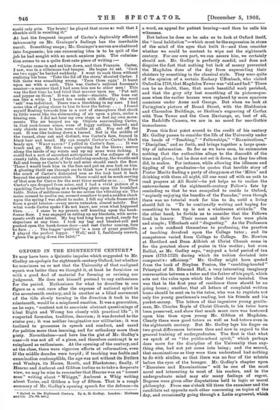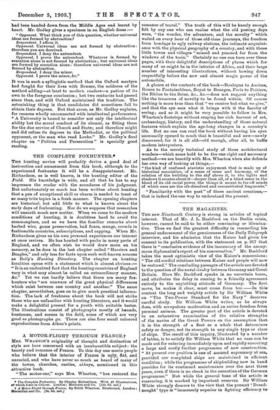OXFORD IN THE EIGHTEENTH CENTURY.* TT may have been a
Quixotic impulse which suggested to Mr. Codley an apologia for eighteenth-century Oxford, but whether fie convinces us or not that the University of that maligned epoch was better than we thought it, at least he furnishes us with a good deal of material for forming or revising our judgment. He does not himself pretend to any enthusiasm for the period. Enthusiasm for what he describes in one figure as a rest cure after the expense of national spirit in the seventeenth century, and in another as a blind movement of the tide slowly turning in the direction it took in the nineteenth, would be a misplaced emotion. It was a generation, as he says, "content not to associate abstract questionings of ideal Right and Wrong too closely with practical life "; it respected formulae, tradition, decorum; it was devoted to the status quo; it was neither imaginative nor utilitarian; it was inclined to grossness in speech and conduct, and cared for politics more than learning, and for orthodoxy more than piety. Nevertheless—and here lies the gist of Mr. Godley's case—it was not all of a piece, and therefore contempt is as misplaced as enthusiasm. At the opening of the century, and at the close, there were vigorous efforts at reformation, even if the middle decades were torpid ; if teaching was feeble and .examination contemptible, the age was not without its Butlers alnd Wesleys, its Horne, Routh, and Blackstone; finally, if Hearne and Amherst and Gibbon incline us to take a desperate view, we may be wise to remember that Hearne was an" honest snail" writing about " Whiggs," Amherst a Whig writing .about Tories, and Gibbon a boy of fifteen. That is a rough -summary of Mr. Godley's opening speech for the defence—in • Oxford in the Eighteenth Centu and Co. CA. 64. net.) ry. By A. D. Godley. London: Methuen
a word, an appeal for patient hearing—and then he calls his witnesses.
But before he does so he asks us to look at Oxford itself, the "local habitation "—which must be the expression in stone of the mind of the ages that built it—and then consider whether we could be content to wipe out the eighteenth century. For our own part, we can assure him, we certainly should not. Mr. Godley is perfectly candid, and does not disguise the fact that nothing but lack of money prevented the Magdalen dons of the day from superseding their cloisters by something in the classical style. They were quite of the opinion of a certain Zachary Uffenbach, who visited Oxford in 1710, that Magdalen Tower was "old and bad." There can be no doubt, then, that much beautiful work perished, and that the grey city lost something of its picturesque- ness when the earlier houses were replaced by more spacious mansions under Anne and George. But when we look at Farington's picture of Broad Street, with the Sheldouian and Clarendon Buildings, or Skelton's engraving of Carfax with Tom Tower and the Corn Exchange, or, best of all, the Radcliffe Camera, we are in no mood for neo-Gothio iconoclasme.
From this first point scored to the credit of his century Mr. Godley passes to consider the life of the University under the heads of "Teaching," "Fellowships," "Examinations," "Discipline," and so forth, and brings together a large quan- tity of information. So far as we have seen, he extenuates nothing that the authorities allege to the discredit of the time and place ; but he does not set it down, as they too often did, in malice. For instance, while allowing the idleness and tippling of the graduates—he quotes that terrible story of Pastor Moritz finding a party of clergymen at the 'Mitre' and drinking with them all night, till one went off with an oath to read prayers at All Souls'---be yet helps us to realise the untowardness of the eighteenth-century Fellow's fate by reminding us that he was compelled to reside in Oxford, "supinely enjoying the benefits of the Founder," even though there was no tutorial work for Limn to do, until a living should fall in. "To be continually waiting and hoping for something to turn up is not a wholesome attitude." On the other hand, he forbids us to consider that the Fellows lived in luxury. Their rooms and their fare were plain and simple ; Uffenbach said "disgusting." As the Professors as a rule confined themselves to professing, the practice of teaching devolved upon the College tutor ; and its competence varied from College to College. Dr. Newton at Hertford and Dean Aldrich at Christ Church come in for the greatest share of praise in this matter ; but even Banjo), as Mr. Godley says, "enjoyed a brief period of ten years (1713-1723) during which its tuition deviated into comparativ) efficiency." Mr. Godley might have quoted from the book of Stephen Fenton, the " rambling-headed " Principal of SL Edmund Hall, a very interesting imaginary conversation between a tutor and the father of his pupil, which sets out the rules upon which the ideal tutor insisted. One was that in the first year of residence there should be no going home ; another, that all letters of complaint written home should be sent on to the tutor, who was to regulate not only the young gentleman's reading, but his friends and his pocket-money. The letters of that ingenious young gentle- man, Mr. Charles Boyle of Christ Church, to his tutor have been preserved, and show that much more care was bestowed upon him than upon young Mr. Gibbon at Magdalen. Clearly there were good tutors as well as bad tutors even in the eighteenth century. But Mr. Godley lays his finger on two great differences between then and now in regard to the general training of undergraduates. The first is that what we speak of as "time public-school spirit," which perhaps does more for the discipline of the University than any- thing else, had not yet come into being ; and the second, that examinations as they were then understood had nothing to do with studies, so that there was no fear of the schools before the eyes of the lounger. Mr. Godley's chapter upon "Exercises and Examinations" will be one of the most novel and interesting to most of his readers, and in the undergraduate mind may stir many feelings of regret. Degrees were given after disputations held in logic or moral philosophy. From one o'clock till three the examiner and the candidate sat opposite each other conversing on topics of the day, and occasionally going through a Latin argument, which
had been handed down from the Middle Ages and learnt by heart. Mr. Godley gives a specimen in an English dress :—
"Opponent. What think you of this question, whether universal ideas are formed by abstraction? Respondent. I affirm it. Opponent. Universal ideas are not formed by abstraction: therefore you are deceived.
Respondent. I deny the antecedent. Opponent. I prove the antecedent. Whatever is formed by sensation alone is not formed by abstraction ; but universal ideas are formed by sensation alone: therefore universal ideas are not formed by abstraction.
Respondent. I deny the minor.
Opponent. I prove the minor, &c."
It was in such a syllogistic method that the Oxford martyrs had fought for their lives with Bonner, the coldness of the
method adding—at least to modern readers—a pathos of its own to the foregone conclusion ; but two centuries had passed since then, and still Oxford maintained the tradition. The astonishing thing is that candidates did sometimes fail to obtain their degrees. But that arose, as Mr. Godley explains, for reasons wholly unconnected with intellectual performance. " A University is bound to consider not only the intellectual
ability but the moral conduct of its alumni, as fitting them for the due service of Church and State; and therefore might and did refuse its degrees to the Methodist, or the political opponent, or the man who read Locke." Mr. Godley's final chapter on "Politics and Persecution" is specially good reading.







































































 Previous page
Previous page